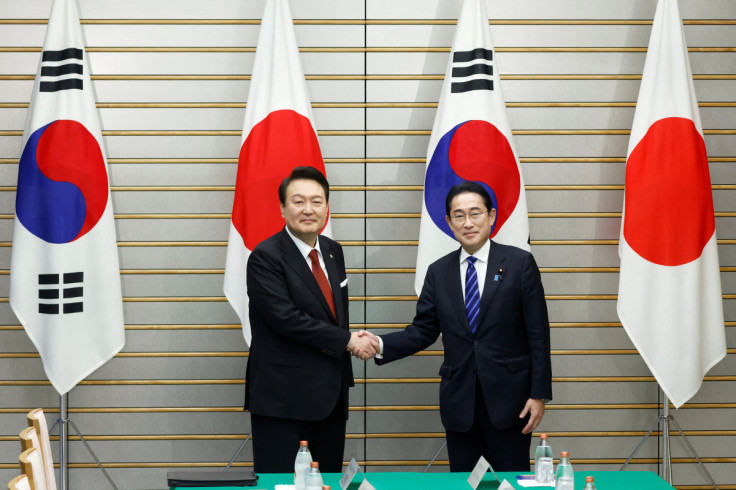Japan hosts South Korean president for first time in 12 years amid threats from North Korea
This move will be important step in mending strained relations between the two countries

South Korean President Yoon Suk Yeol and his wife Kim Keon Hee arrived in Tokyo for a 'fence-mending summit' amid nuclear threats from North Korea on Thursday.
This is a first of such visits in the last 12 years between the neighbouring countries as the two seek to confront the nuclear threats from North Korea and increasing concerns with China.
Both Japan and South Korea are facing security challenges which were on stark display just hours before the summit as North Korea fired a long-range ballistic missile into the waters of the east coast of the Korean Peninsula. It marks the fourth intercontinental ballistic missile (ICBM) launched by North Korea in less than a year. The country had previously conducted a long-range missile test on Feb. 18.
The most recent launch was condemned by Hirokazu Matsuno, Japan's Chief Cabinet Secretary, who referred to it as a "reckless act" that "threatens the peace and security of our country, the region, and the international community."
Yoon's meeting with Japanese Prime Minister Fumio Kishida will be an important step in mending strained relations between the two crucial U.S. allies in Asia after decades of disputes.
According to CNN, the meeting between the two leaders has been hailed as "an important milestone" in the growth of bilateral ties by Yoon's office.
The concerns and strategic interests shared between South Korea and Japan
The growing security concerns about Pyongyang's increasingly frequent missile tests, China's rising assertive military posture, and tensions across the Taiwan Strait — an area that both Tokyo and Seoul claim is essential to their respective security, have played a significant role in the reconciliation efforts between the two neighbours.
The mending relations is good news for the U.S. which had been pushing for the same over the years.
"Our working together not only on the political front, but on the strategic front, on the deterrence front, is what North Korea is scared about. It's also what China doesn't want to see happen," Rahm Emanuel, U.S ambassador to Japan, said on Thursday.
According to Emanuel, the U.S., Japan, and South Korea held over 40 trilateral meetings last year – more than they did the previous five years put together.
Yoon stated to the media on Wednesday that "there is an increasing need for Korea and Japan to cooperate in this time of a polycrisis," citing the proliferation of North Korean missile and nuclear threats as well as the disruption of global supply chains.
"We cannot afford to waste time while leaving strained Korea-Japan relations unattended," he said, while emphasising that both sides are working more cooperatively to battle the security concerns.
Japan and South Korea move towards overcoming decades-long disputes
The hostility between the two East Asian countries dates back to Japan's colonial rule over the Korean Peninsula a century ago.
Although the two nations' ties were normalised in 1965, unresolved historical conflicts have persisted, particularly those involving colonial Japan's use of forced labour and so-called "comfort women" sex slaves, where Korean girls and women were forced to work in Japanese wartime brothels.
The United States' attempts to present a united front against North Korea in recent years have been undermined by the frequently tense relations, amid Beijing's increasing aggressiveness. However, the two most crucial partners to the U.S. in the region now seem prepared to start over and turn a new page.
Japan and South Korea decided on Thursday to end a trade dispute that has strained relations for years as the latest gesture of goodwill before the summit.
Japan will relax export restrictions on high-tech materials used in semiconductors and display panels to South Korea, while Seoul will withdraw its complaint against Tokyo regarding the restrictions to the World Trade Organization (WTO).
Tokyo imposed the curbs in 2019 amid rising tensions over a decades-old row with Seoul.
South Korea made progress towards settling that disagreement last week by announcing a compensation plan for former forced labourers that does not require Japan's direct involvement.
The compensation plan for victims of forced labour during Japan's occupation from 1910 to 1945 will be sponsored by private Korean corporations through a public foundation, instead of asking Japanese firms to contribute to the reparations. This move was welcomed by Japan and applauded by the White House.
Yoon has been striving to improve and mend relations with Japan even if it means pushing back against domestic public pressure on disputes and highly sensitive issues like the compensation plan.
Joel Atkinson, a professor specialising in Northeast Asian international politics, stated that apart from the growing North Korean nuclear threat, China also seems to have played a significant role in the South Korean president's willingness to face the domestic backlash over the compensation deal.
© Copyright IBTimes 2025. All rights reserved.





















